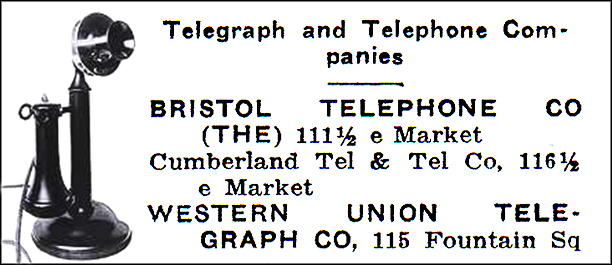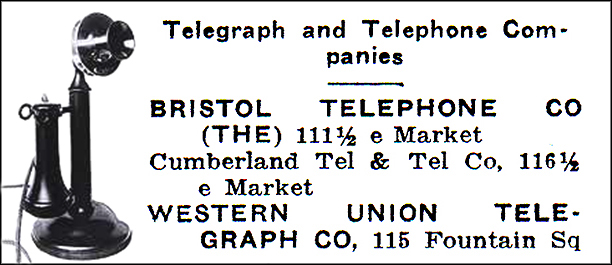In 1989, area resident, Bill Reece, shared with Press writer, Tom Hodge, a 1921 combined Johnson City and Elizabethton telephone directory issued by the Cumberland Telephone and Telegraph Company. A city directory from that era shows the business was located at 116.5 E. Market Street.

Tom noted that a person could have called everyone in Elizabethton in about an hour because the register contained only 41 names. Phone number “1” belonged to E.C. Alexander. The listing for Johnson City was somewhat longer with just over four pages of names, addresses and phone numbers. The first listee, residence and phone number was A.H. Abernathy, Buffalo Street, “207”; the last one was F. Zulante, Eighth Avenue, “56”. The Fire Department could be reached at “400” and the Police Department at “57.” Unlike today’s fully automated system, the caller had to deal with an operator to make a phone call. She would open with her familiar “number please.”
The directory contained a page on “How Do You Use the Telephone?” It showed two ways to use the device – a right and a wrong one. The correct procedure revealed a man holding the earpiece to his ear and leaning forward to talk into an upright phone. The incorrect position had the same man leaning back in his chair, cradling the telephone in front of him. The instructions said, ”When you place your lips close to the transmitter and speak clearly and distinctly in an even tone of voice, the operator can hear you plainly and understand the number you request. When you are inattentive and speak ‘at’ the telephone instead of ‘into’ it, the operator is liable to misunderstand your order and the called party cannot hear you distinctly. This makes the operator’s work more arduous and creates unnecessary difficulties for all parties concerned.”
The book advertised that a customer could have a phone with either individual or party line service for a $3.50 installation charge. Under “Rules and Regulations,” the directory declared, “The use of a subscriber’s telephone is limited to the subscriber, his family or employees in his interest.” That surprising strict requirement implies that a neighbor or friend could not use the family’s telephone for any reason – casual or emergency. Imagine that. The directory further warned that unauthorized agents were offering telephone aids to the phone company’s customers. It cautioned subscribers against the purchase of such illegal devices and warned them that their use was strictly prohibited.
The directory contained considerable advertising including Free Service Tire Company that purchased an ad on the front cover touting its Kelly Springfield Racine and Firestone tires. J.A. Vines, president of The Peoples Bank, boasted of resources of more than $300,000 at its location at Spring and Tipton streets. Unaka & City National Bank and City Savings & Trust Company, in what later became the Hamilton Bank building, had much larger resources – $5 million.
Tennessee National Bank, located on Spring Street in the Elk Building (later site of the Sevier Theatre), had nearly $2 million in resources after just five months subsequent to opening for business. The directors were S.C. Williams, C.E. Cargille, Adam B. Crouch, George T. Wofford, J.E. Brading, J.A. Summers, H.G. Morrison, Evan S. Rees, B.W. Horner, Hammond Prosser, T.F. Dooley, L.R. Driver and Lee F. Miller.
Thanks to Bill and Tom, we are treated to another reflective glimpse into the nostalgic world of yesteryear.
